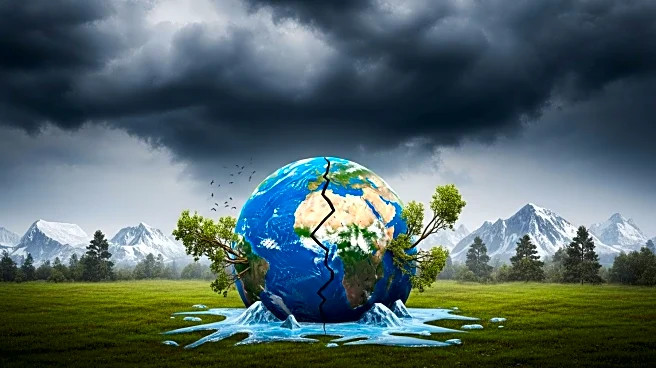What's Happening?
President Trump is actively working to halt the global transition away from fossil fuels, not only within the United States but also by influencing other countries. The administration is employing economic measures such as tariffs, visa restrictions, and port fees to discourage countries from supporting international agreements aimed at reducing greenhouse gas emissions. Additionally, trade deals negotiated by the administration often include clauses requiring partner nations to purchase significant quantities of U.S. oil and gas. This approach aligns with the administration's stance that prioritizes economic and national security over climate goals, as stated by a White House spokesperson. The administration has also allied with oil-producing nations like Saudi Arabia to resist limitations on petroleum-based plastics production.
Why It's Important?
The actions taken by President Trump have significant implications for global climate policy and the efforts to combat climate change. By pressuring other nations to maintain or increase fossil fuel consumption, the administration's policies could undermine international climate agreements and slow the transition to renewable energy sources. This approach may benefit U.S. oil and gas industries in the short term by increasing demand for American fossil fuels. However, it poses risks to global environmental health and could lead to increased climate-related challenges, such as extreme weather events and rising sea levels. The administration's stance may also strain diplomatic relations with countries committed to reducing their carbon footprint.
What's Next?
The international community may respond to President Trump's policies with increased efforts to solidify climate agreements and seek alternative energy partnerships. Countries affected by the administration's tariffs and restrictions might explore new alliances or strengthen existing ones to counterbalance U.S. influence. Environmental advocacy groups and renewable energy sectors could intensify their campaigns to promote clean energy solutions and pressure governments to adhere to climate commitments. The long-term impact of these policies will depend on the global response and the ability of nations to navigate the economic and political pressures exerted by the U.S.
Beyond the Headlines
The ethical implications of President Trump's actions raise questions about the responsibility of powerful nations in addressing global challenges like climate change. The administration's prioritization of economic interests over environmental concerns may lead to debates about the balance between national security and global stewardship. Additionally, the resistance to climate agreements could influence cultural perceptions of environmental responsibility and the role of government in fostering sustainable practices.










